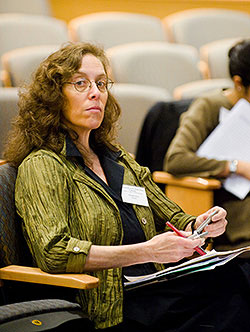Response to 'Muslim Students in NYC': Do the Numbers Tell the Whole Story?
Experts respond to the Cristillo study; an ethnographic study of Palestinian youth; and readings from a unique anthology of oral histories
TC’s new study on the post 9/11 public school experiences of Muslims in
To George Bond, Professor, the work embodied the mission of the department he chairs – International and Transcultural Studies – because “it is through the schools that the U.S. is being transformed into part of the rest of the world,” and because “nowhere else except in Mecca during the Hajj [the time of Muslim pilgrimage], can you find Muslims from so many Muslims from different countries” as in New York City.
Each of the two respondents to Cristillo’s study, Hisham Aidi of
Aidi, who has worked extensively with Cristillo over the years, described meeting with a Muslim parent in Spanish Harlem who was considering sending his kids back to Yemen when they turn five “because he was afraid they’ll lose their cultural heritage.
Typically the trigger for the decision to try to make such an identity change , Aidi said, is an encounter with bigotry or discrimination. But such experiences, particularly for boys, can lead to the opposite reaction – a decision to embrace a more fundamental Islamic identify.
Fine praised Cristillo’s research “as amazingly ambitious,” but cautioned that “we don’t yet know the developmental consequences to young people of living in a society where Sean Bell can be shot down with no consequences, or where Debbie Almontaser [recently ousted as principal of Kahlil Gibran High School in New York City] can be forcibly removed from her job. So kids may have great self-esteem, but what does it mean for them to be living in this toxic, anti-Islamic environment? How does it affect their souls? As psychologists, we don’t know.”
“Boys are fighting the ghost of ‘You’re a terrorist,’” she said, referring to input she received in doing focus groups with Muslim young people. “When we asked them what message they would most want to put in an MTV movie, they said it was, ‘Check my knapsack and see that there are no bombs.’”
Girls, on the other hand, are more typically seen as oppressed victims who need rescuing from Muslim males. The message they wanted to put in an MTV movie, Fine said, was “I wear Hijab [a head scarf] because it’s like wearing a helmet when you ride a bicycle – it lets me comfortable and go anywhere.”
On the deepest level, however, Fine says that Muslim boys and girls share a gut-level reaction that is akin to the feelings of Japanese-Americans who were interned during World War II.
“They became an external out-group, and when you read their collected letters, they say, in essence, ‘as an American, I can’t believe that you’re treating me like this. I thought this was all about democracy and belonging. I thought I was a member of the moral community, so how did I get placed outside it?”
Published Friday, May. 2, 2008
